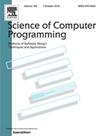使用参数化事件扩展EB4EB框架
IF 1.4
4区 计算机科学
Q3 COMPUTER SCIENCE, SOFTWARE ENGINEERING
引用次数: 0
摘要
EB4EB,代表Event-B的Event-B,是一个使用一阶逻辑和集合论支持Event-B模型形式化的框架,因此可以将它们作为一级对象来操作。这个框架依赖于Event-B代数理论,它作为一个元理论,显式地形式化了Event-B机器的所有特征。状态、事件、不变量、变量等等……通过数据类型和操作符形式化。当这个元理论被实例化时,Event-B模型就变成了在Event-B上下文中描述的一阶逻辑和集合论公式。因为它可以将机器元素作为公式中的术语来处理,所以EB4EB框架可以定义新的特定证明义务和分析。这样的分析可以应用到任何EB4EB机器上,以建立Event-B方法中原生不存在的高级属性,例如死锁自由或活动需求。这些分析是非侵入性的,因为它们不需要为了执行而改变机器。在以前的EB4EB框架的形式化中,只处理状态和事件,限制了框架的表达推理能力。本文提出了EB4EB框架的扩展,以支持参数化事件,这是Event-B的一个重要特征。这个扩展是不直接在EB4EB。事实上,事件- b理论支持的类型系统还不够丰富,无法像在EB4EB中形式化的其他事件- b特性那样以建设性的方式描述这种扩展。本文提出的解决方案包括定义事件参数定义的公理化形式化。我们还展示了我们定义的证明义务和模型分析来处理事件参数。我们开发的不同案例研究说明了这种方法。本文章由计算机程序翻译,如有差异,请以英文原文为准。
Extending the EB4EB framework with parameterised events
EB4EB, standing for Event-B for Event-B, is a framework that supports the formalisation of Event-B models using first-order logic and set-theory, so that it becomes possible to manipulate them as first-class objects. This framework relies on an Event-B algebraic theory, which serves as a meta-theory formalising, explicitly, all of the features of an Event-B machine. States, events, invariants, variants, etc... are formalised through data-types and operators. When this meta-theory is instantiated, an Event-B model becomes a first-order logic and set-theoretic formula, described in an Event-B context.
Because it can handle machine elements as terms in formulas, the EB4EB framework enables the definition of new specific proof obligations and analyses. Such analyses may then be applied to any EB4EB machines in order to establish advanced properties, not natively present in the Event-B method, such as deadlock-freeness or liveness requirements. These analyses are non-intrusive since they do not require to alter the machine in order to be performed.
In the previous formalisation of the EB4EB framework only states and events were handled, limiting the expressive reasoning power of the framework. This paper presents an extension of the EB4EB framework to support parameterised events, an important feature of Event-B. This extension is not straightforward in EB4EB. Indeed, the typing system supported by Event-B theories is not rich enough to describe such extension in a constructive manner as for the other Event-B features formalised in EB4EB. The proposed solution, described in this paper, consists in defining an axiomatic formalisation of event parameters definitions. We also show that the proof obligations and model analyses we have defined scale to handle event parameters. The approach is illustrated on different case studies we have developed.
求助全文
通过发布文献求助,成功后即可免费获取论文全文。
去求助
来源期刊

Science of Computer Programming
工程技术-计算机:软件工程
CiteScore
3.80
自引率
0.00%
发文量
76
审稿时长
67 days
期刊介绍:
Science of Computer Programming is dedicated to the distribution of research results in the areas of software systems development, use and maintenance, including the software aspects of hardware design.
The journal has a wide scope ranging from the many facets of methodological foundations to the details of technical issues andthe aspects of industrial practice.
The subjects of interest to SCP cover the entire spectrum of methods for the entire life cycle of software systems, including
• Requirements, specification, design, validation, verification, coding, testing, maintenance, metrics and renovation of software;
• Design, implementation and evaluation of programming languages;
• Programming environments, development tools, visualisation and animation;
• Management of the development process;
• Human factors in software, software for social interaction, software for social computing;
• Cyber physical systems, and software for the interaction between the physical and the machine;
• Software aspects of infrastructure services, system administration, and network management.
 求助内容:
求助内容: 应助结果提醒方式:
应助结果提醒方式:


